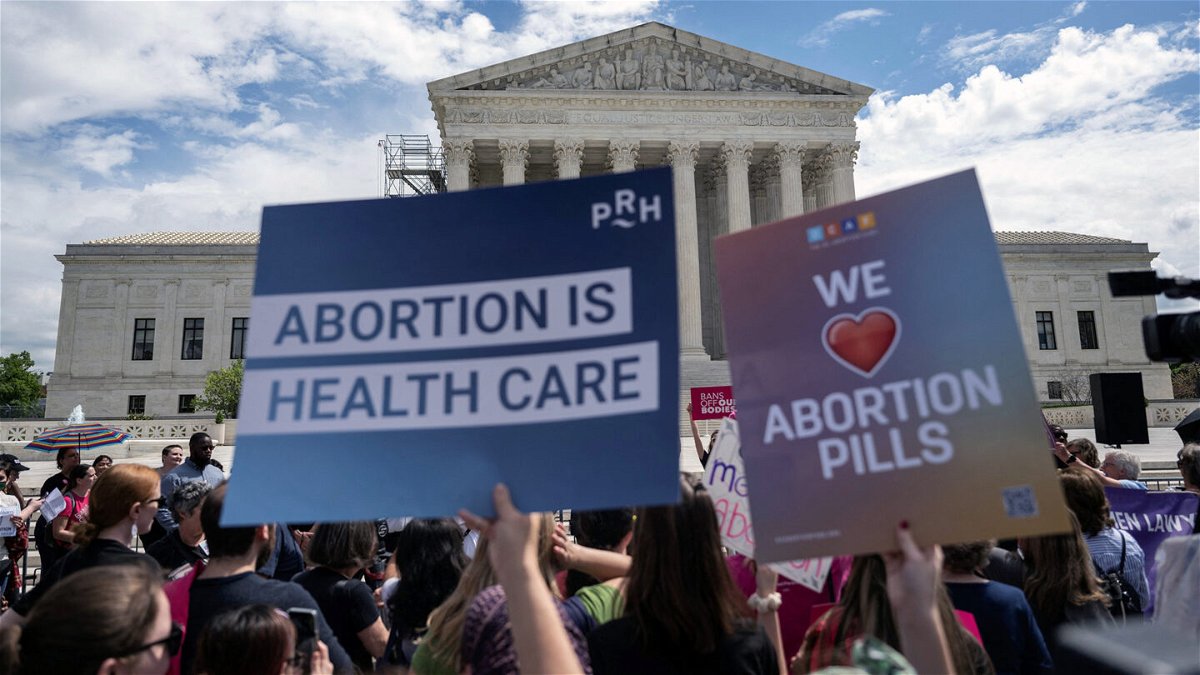Supreme Court temporarily extends access to abortion drug, sets Friday night deadline

(CNN) -- Supreme Court Justice Samuel Alito on Wednesday temporarily extended a hold on a lower court ruling that would have imposed restrictions on access to an abortion drug, a move meant to give the justices more time to consider the issue.
In a similar order last week, Alito had said the court would rule by 11:59 p.m. ET on Wednesday. The new order -- called an "administrative stay" -- moves that deadline to Friday, April 21.
The order was written by Alito because he has jurisdiction over the lower court that ruled in the dispute.
"Today's order tells us nothing about how the full Court is going to rule other than that it's likely there will be some kind of writing, whether by the majority or by Justices who might be writing separate concurrences or dissents," said Steve Vladeck, CNN Supreme Court analyst and professor at the University of Texas School of Law. "But it's impossible to know which way that ruling is going to go; all we know for sure is that we'll know more by the end of the evening on Friday."
The case is the most important abortion-related dispute to reach the high court since the justices overturned Roe v. Wade last term, triggering conservative states across the country to either ban or severely restrict the procedure. How the dispute over medication abortion is ultimately resolved could make it more difficult for women to obtain abortion, even in the states that still allow it.
At issue is the scope of the US Food and Drug Administration's authority to regulate a drug, mifepristone, that the medical community has deemed safe and effective. Mifepristone has been used by millions of women across the country in the more than two decades that it has been on the market.
The legal controversy began last November when a group representing doctors who oppose abortion filed suit, arguing that the FDA had not done enough to ensure the safety of the drug some two decades earlier.
US District Court Judge Matthew Kacsmaryk, a Trump appointee, issued a broad ruling on April 7 that blocked the approval of the drug, as well as changes the FDA made in subsequent years to make the drug more accessible. He, however, delayed the effective date of his ruling by seven days to give time for an appeal.
Rejecting the consensus of the medical community, Kacsmaryk raised questions about the safety of the drug, peppering his opinion with jargon that is often used by opponents of abortion. He labeled doctors who perform the procedure "abortionists" and explained that he would reject the term "fetus" in favor of the more inflammatory "unborn human." Instead of referring to the procedure as a "medication abortion," he insisted on calling it a "chemical abortion."
The FDA, Kacsmaryk contended at one point, "acquiesced on its legitimate safety concerns -- in violation of its statutory duty -- based on plainly unsound reasoning and studies that did not support its conclusions."
Mainstream medical associations have rebuked his assertions about the dangers of the drug, and mifepristone has been shown to be safer than common medicines like penicillin and Viagra.
On a key threshold issue, the judge insisted that the plaintiffs -- doctors who do not use or prescribe the drug -- had the legal right to be in court to make their case because they allege that the use of the drug could "overwhelm" the medical system.
Stunned by the breadth of the decision, the Biden administration and Danco, a manufacturer of the drug, filed with the 5th US Circuit Court of Appeals.
The appeals court ultimately let stand the government's approval of the drug, but agreed with Kacsmaryk that access could be limited.
A divided three-judge panel ordered a return to the stricter, pre-2016 FDA regime around the drug, which prevents mailing the pill to patients who obtained it through telehealth, or virtual visits with their providers, rather than traveling to a clinic or hospital to obtain the drug in person. It also effectively revokes the 2019 approval of the generic version of the drug. The restrictions also affect the instructions on the label for the medication, shortening the window of obtaining the pill to seven weeks into pregnancy as opposed to 10.
It's possible however that even with the ruling in effect, some providers could go "off-label" and continue to prescribe mifepristone up until 10 weeks.
The 5th Circuit claimed that the FDA's rules for the drug created "an exceedingly unusual regime," and that the anti-abortion doctors had the right to sue over it because they would "necessarily be injured by the consequences" of the FDA's decision "to cut out doctors from the prescription and administration of mifepristone."
The appeals court said that the statute of limitations likely barred the plaintiffs from challenging the 2000 approval, but that they were likely to succeed in their claims against the FDA's more recent moves to adjust the rules around the drug.
The court accused the FDA of having a "ostrich's-head-in-the-sand approach" to the drug that was "deeply troubling."
Solicitor General Elizabeth Prelogar urged the justices to intervene in legal papers citing "unprecedented lower court orders countermanding FDA's scientific judgment and unleashing regulatory chaos by suspending the existing FDA-approved conditions of use for mifepristone."
This story has been updated with additional details.
The-CNN-Wire
™ & © 2023 Cable News Network, Inc., a Warner Bros. Discovery Company. All rights reserved.


